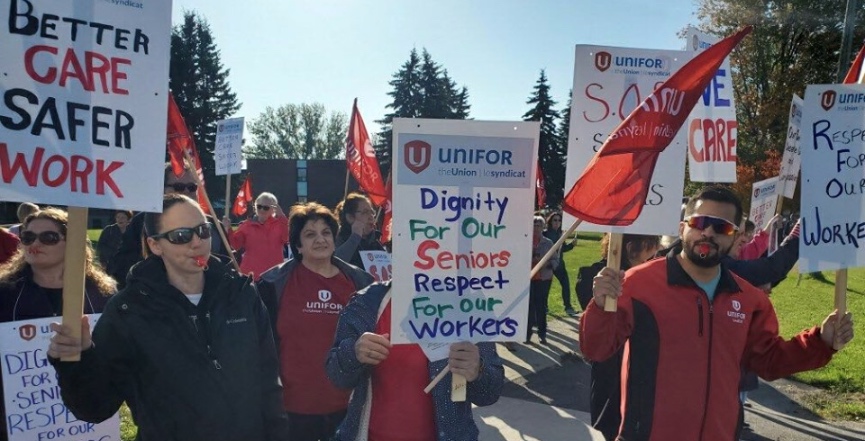The province-wide shortage of personal support workers (PSWs) has turned into a crisis in long-term care across Ontario. Chronic understaffing is resulting in burnt out workers who are unable to provide adequate care for residents.
According to Katha Fortier, a Unifor spokesperson, the conditions at the Hogarth Riverview Manor long-term care facility in Thunder Bay are particularly bad.
The union represents 9,000 workers in nursing homes across Ontario and is currently attempting to bargain a new contract for staff at the Hogarth Riverview Manor.
“Everybody at work feels like all they do is cut corners, and try to get as much done as they possibly can in a day,” Fortier says. “These workers come in early, they stay late and they work through breaks.”
Hogarth Riverview Manor has 544 beds and is one of the largest nursing homes in Ontario.
Workers protest alongside residents
Fortier says that management has not addressed the long-standing problem of poor staffing, which is one of the fundamental issues at the bargaining table.
After negotiations broke down, workers were joined by residents and their family members to protest outside the home last week.
New management, same results
St. Joseph’s Care Group is the non-profit organization that owns the facility, although it is managed by a third-party.
After a sustained period of complaints and inspections, in November 2017 the government handed over the home’s management to Extendicare, a for-profit corporation with a dubious track record in both Canada and the U.S.
Fortier says the change in management had not worked, pointing out the skewed staffing ratios that often require each worker to care for a dozen residents.
Last year, Unifor’s 6-minute challenge campaign highlighted the unrealistic expectations placed on PSWs who have a handful of minutes to wake a resident up and get them ready for breakfast.
The deteriorating working conditions in long-term care combined with poor wages is leading to a severe PSW shortage, which is making the situation even worse, Fortier says.
A systemic issue
Lack of staffing has long been decried by unions, health care advocates and experts for poor quality of long-term care in Ontario.
Although the recommended minimum care standard is 4.1 hours of direct care per resident per day, the advocacy group Ontario Health Coalition’s 2019 report showed the actual figure has hovered below 3 hours for the past decade.
In 2016, the NDP put forward a bill that would legislate a minimum care standard of four hours. Although supported unanimously by all the parties — the second reading passed 44 to zero — the Liberal government did not pass the bill.
Even though the Conservatives also supported the bill when they were in opposition, Fortier pointed out their inaction in power.
“The Conservatives [in opposition] were really nice to talk to about the whole issue,” she said. “And now that they are in power, they really don’t want to talk to us about it.”
Low levels of staffing has been linked to increasing violence and even deaths. According to a recent Ministry of Health and Long-Term care report, two deaths in a Walkerton, Ontario home could be traced to inadequate staffing.
Ownership matters
There are three types of long-term care homes in Ontario — 58 per cent owned by for-profit companies, 24 per cent by non-profits and 18 per cent by municipalities.
Academic research shows that for-profit homes tend to have lower staffing (and higher rates of mortality and hospitalization) than non-profit and municipal homes, as surplus funds are channeled to owners and shareholders rather than to staffing.
All nursing homes including for-profit facilities receive government funding, which essentially means taxpayers subsidize businesses profiting from health care services.
“What do we expect when most of the care of our nursing homes is given to for-profit operators?” Fortier asked rhetorically.
“Extendicare is doing very well. So is Chartwell, so is Revera. All of these companies are still making profits.”
Zaid Noorsumar is rabble’s labour beat reporter for 2019, and is a journalist who has previously contributed to CBC, The Canadian Press, the Toronto Star and Rankandfile.ca. To contact Zaid with story leads, email zaid[at]rabble.ca.




